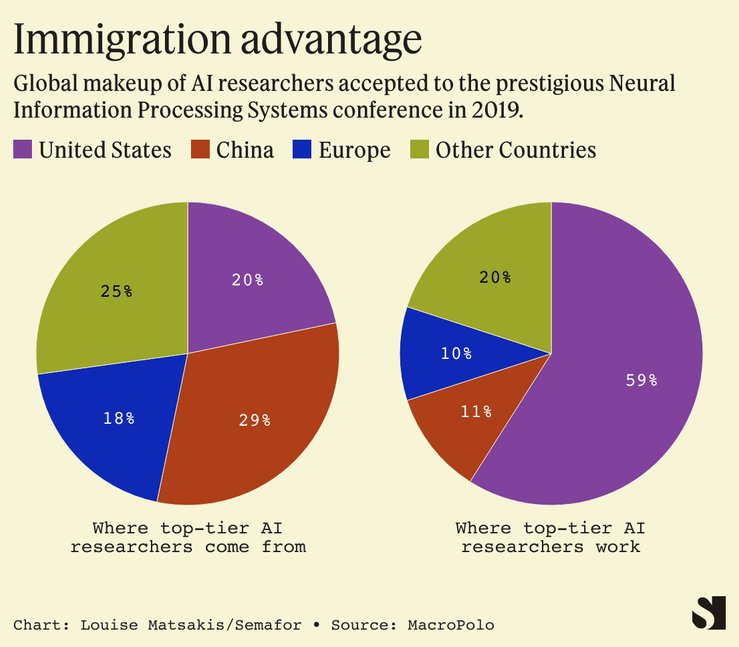The News
The sudden rise of OpenAI’s ChatGPT has caused a frenzy in China, prompting tech giants like Tencent, Baidu, and Alibaba to announce their own alternatives and sending the stock price of Chinese artificial intelligence companies soaring.
While the Microsoft-supported chatbot is technically blocked in China, its overnight success has sparked a wave of copycats in the country’s tech sector, which only recently began emerging from a prolonged government clampdown.
Louise’s view

China’s rush to emulate ChatGPT demonstrates that it remains largely a follower when it comes to developing advanced forms of artificial intelligence, and the United States is still the trailblazer. For the past decade or so, Chinese research institutions and companies have often iterated on the latest AI models roughly one to two years after their American competitors led the way.
This time, Baidu will likely be the first Chinese firm to follow in OpenAI’s footsteps. The company says it is nearly done testing a chatbot named Ernie, which is based on a large language model Baidu introduced in 2019. The company plans to release Ernie next month and integrate it into its main search engine, mirroring Microsoft’s plans to integrate ChatGPT into Bing.
But the similarities largely stop there. Baidu and other tech companies in China are operating in a vastly different regulatory, political, and cultural environment than the one OpenAI is in the U.S. While the Chinese government is eager to help foster homegrown innovation, it has also been aggressive in regulating new technologies. Over the last few years, it has introduced a series of new rules designed to protect consumers and ensure tech giants can’t amass powers that threaten the state. Some of the challenges facing Chinese AI companies include:
- Concerns around content moderation: The Chinese government requires tech companies to censor many forms of politically sensitive content. That makes it incredibly dangerous to release a free-wheeling product like ChatGPT, whose outputs are frequently inaccurate and often impossible to predict, despite safeguards OpenAI put in place.
- “Policy-wise, it is much more difficult for Chinese companies to just throw something out into the wild like U.S. companies can do here,” said Rui Ma, founder of the investment consulting firm Tech Buzz China. “Whatever becomes available to the public in China will likely be much more limited to start.”
- Baidu has already released a censored image generator similar to OpenAI’s DALL·E that refuses to produce pictures of Tiananmen Square or Chinese leader Xi Jinping. Ernie Bot, however, may prove harder to control, particularly since it was reportedly trained on Chinese and English material from both inside and outside China’s Great Firewall. “How long could this possibly last until somebody gets it to spit out something that is so politically non-permissible?” said Graham Webster, editor-in-chief of the DigiChina Project at Stanford’s Cyber Policy Center.
- The regulatory environment: Unlike the U.S., China has already enacted national regulations dictating how artificial intelligence programs can be used. Last month, for instance, the country’s so called “deepfake law” went into effect.
- It requires that companies label all forms of synthetically generated media — in other words, the outputs of models like ChatGPT or DALL·E. “If Baidu is going to try to release something in this genre, it will be navigating a new regulatory system that has significant risk if you get it wrong,” said Webster.
- Recent export controls: In October, the U.S. government announced sweeping rules limiting the export of advanced computer chips to China. In the long run, the regulations could make it harder for the country to develop cutting-edge forms of artificial intelligence.
- Over the next few years, though, Matt Sheehan, a fellow at the Carnegie Endowment for International Peace studying China’s AI ecosystem, said they are unlikely to put China at a significant disadvantage.
- Brain drain: Chinese research institutions struggle to attract and retain the most talented people in the world working on artificial intelligence. While the country produces around 30% of leading AI researchers overall, the majority of them go on to live, work, and study in the United States, according to the think tank MacroPolo.
- As tensions between the U.S. and China grow, Chinese researchers may be more reluctant to operate in the U.S. But for now, China’s high number of migrants remains a huge advantage for American firms.
- The local research culture: Sheehan pointed out that there is a much longer tradition in the U.S. of conducting open-ended AI research than there is in China. Tech companies in the People’s Republic “are just more constrained by the profit motive,” he said. That means it can be harder to start firms like OpenAI, which originally began as a non-profit research organization whose sole purpose was to develop advanced artificial intelligence.
Still, Sheehan expects China will probably be able to recreate something like ChatGPT relatively quickly. “It might not be exactly as good or as high-performing,” he said. “The U.S. does continue to be the first one to put these products out there, but they just very quickly proliferate to the other cutting-edge AI labs in other parts of the world.”
Last year, for example, researchers at Tsinghua University — China’s top school — published GLM-130B, a state-of-the-art large language model that outperformed OpenAI’s GPT-3 model released two years earlier. But since then, OpenAI has been working on an even more powerful version called GPT-4, which is predicted to outshine the Tsinghua model that came before it.

Room for Disagreement
A Microsoft executive told journalists last week that the U.S. was only months, not years, ahead of China in artificial intelligence research. They said the state-backed Beijing Academy of Artificial Intelligence (BAAI) was one of three global leaders in the sector, with the others being the Microsoft-OpenAI partnership, as well as Google’s DeepMind.
And Ma pointed out that China’s AI ecosystem is unique, and will likely continue developing in different ways from the West. “With the Chinese internet being much richer in video, you could make the argument that with guardrails in place, Chinese engineers could make more breakthroughs in video just due to user behavior and ecosystem differences,” she said.
The View From Beijing
Beijing’s municipal government announced Monday it would offer support to companies developing AI programs that can compete with ChatGPT. The capital city’s legendary Zhongguancun neighborhood, nicknamed “the Silicon Valley of China,” is home to heavyweight research institutions like BAAI and the Institute of Automation.
Notable
- The newsletter Recode China AI put together a list of generative artificial intelligence projects that Chinese tech giants have announced so far. It also rounded up 14 new AI startups in China, with each valued at over $1 billion.
- Chinese AI researchers have expressed a range of opinions about ChatGPT, which Jordan Schneider translated in his newsletter, ChinaTalk.

